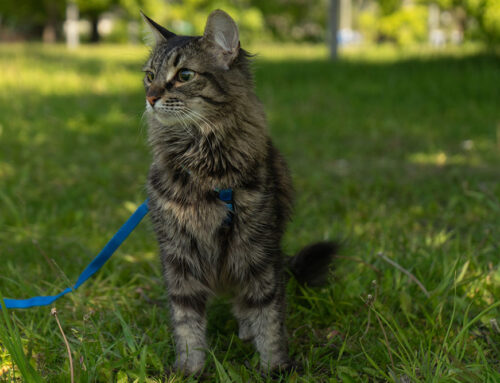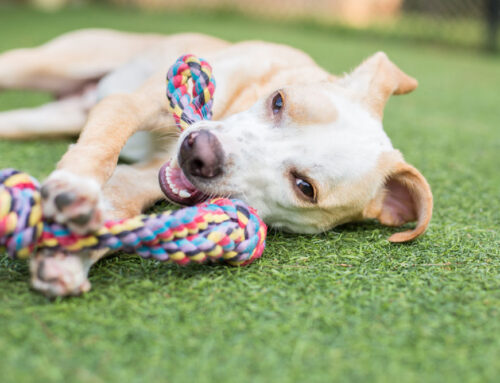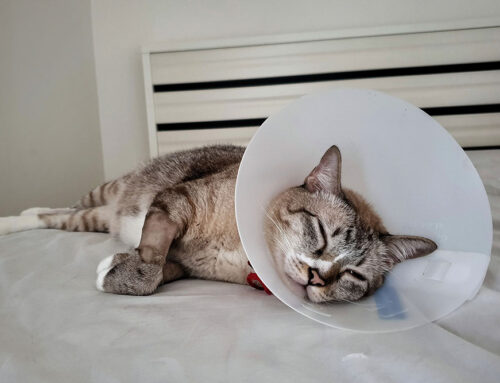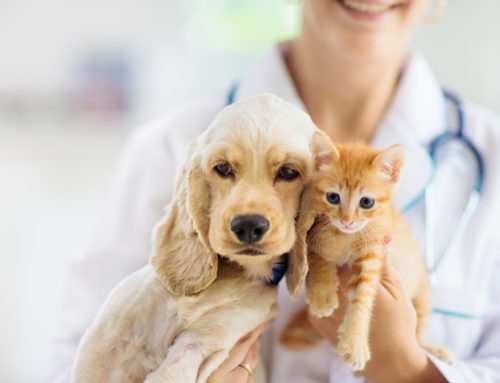Blind, deaf, and amputee pets may have disabilities, but they don’t slow down, and continue to enjoy life to its fullest. Although they may not realize they could use some help, you can make your disabled furry pal’s life much easier. Here are 10 ways to provide your blind, deaf, or amputee pet with extra supportive care.
#1: Provide traction for amputee pets
While your three-legged pet may try to tear around the house like normal, slippery surfaces can pose a serious problem. Tile, wood, and vinyl flooring provide zero traction, and can be difficult for your pet to hop along without slipping and falling. Place carpet runners along your pet’s most traveled pathways for traction. You can also apply grip aids, such as PawFriction or Dr. Buzby’s ToeGrips, to your pet’s paws or nails.
#2: Keep furniture in the same place for blind pets
Blind pets will often memorize your home’s furniture patterns in only a few days to avoid bumping into objects. Avoid rearranging your furniture frequently to ensure your pet’s mental map remains the same and they don’t get injured.
#3: Teach deaf pets visual cues
If your pet lost their hearing because of old age, they may have learned only verbal commands and will not understand visual cues. Train your pet again using hand signals to “Come,” “Sit,” and “Lie down.” To begin with, you may need to entice your pet to behave correctly with a tasty treat, and then pair it with a hand signal.
#4: Use scent markers for blind pets
Use scent markers to safely guide your blind pet through your home rather than breadcrumbs. Tracerz scent markers are essential oil-based dots that can guide your pet with a long-lasting scent.
#5: Provide extra joint support for amputee pets
Pets with three legs experience a great deal of additional stress on the “single” leg, which is doing all the work supporting half the body. Keep your pet at an ideal body weight to minimize joint pressure and stress, and further support joint health with supplements or a prescription diet. Glucosamine and chondroitin are excellent building blocks for joint cartilage, and your Lebanon Animal Hospital veterinarian can recommend the best product for your pet’s joint health.
#6: Consider a “halo” for blind pets
While you may wish you could put your blind pet in a protective bubble, that’s not the most feasible option. Instead, turn to a halo. This device often attaches to a harness, and protrudes as a safety ring around your pet’s head to protect them from bumping into objects.
#7: Establish a routine for your pet
One of the most important methods of keeping your disabled pet safe and secure is establishing a routine and sticking to it. Familiar patterns reduce anxiety and promote feelings of security, as your pet knows what to expect and is unlikely to be startled.
#8: Maintain good hygiene in your disabled pet
Disabled pets, especially those with decreased mobility, can quickly suffer from poor hygiene. If your pet is unable to move to eliminate, they can develop urine scald and skin infections from urine and feces sitting on their skin. Encourage your pet to urinate and defecate outdoors or in a litter box, using a sling or supportive harness to minimize accidents. Check your pet frequently to ensure they remain clean and dry, using unscented baby wipes and waterless shampoo as needed.
#9: Use a vibration-only collar to catch your deaf pet’s attention
Never use a shock collar on your pet, whether or not they are disabled. But, a vibration-only collar that gives no electrical shock can be an effective training tool and capture your deaf pet’s attention before they get into trouble. A slight pulsation can alert your pet they are wandering off too far, or need to turn and look for you.
#10: Bring your pet to our hospital for regular wellness visits

Disabled pets can require more frequent wellness visits to remain happy and healthy, and your Lebanon Animal Hospital team can help with recommendations that will ensure their continued good health. We can quickly spot problems that can be remedied, adjust pain medication, and suggest joint supplements for amputee pets.
Pets with disabilities don’t realize they’re disabled and need extra care, so it’s up to you to be an advocate for your furry pal’s health. Contact your Lebanon Animal Hospital team for help keeping your disabled pet in tip-top shape.








Leave A Comment